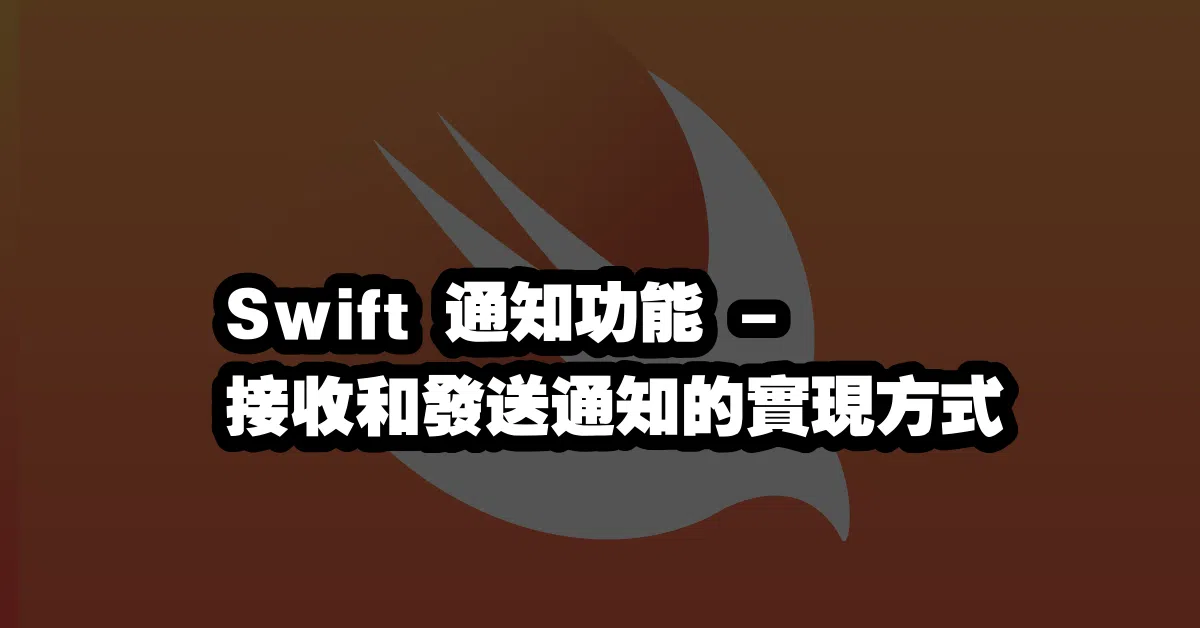“`html
Swift 通知功能概述
在現代應用程式開發中,Swift 的通知功能扮演著關鍵角色,能夠讓應用程式有效地接收和發送通知。這裡將介紹如何使用 NotificationCenter 和 Delegate 兩種方式來實現這一功能,並提供完整的實作範例和最佳實踐,以幫助您在2025年及以後的開發中保持競爭力。
接收通知
接收通知的方式有兩種:使用 NotificationCenter 或使用 Delegate。以下將詳述這兩種方法。
使用 NotificationCenter
使用 NotificationCenter 接收通知的步驟如下:
let notificationName = Notification.Name("MyNotification")
NotificationCenter.default.addObserver(self, selector: #selector(handleNotification), name: notificationName, object: nil)
@objc func handleNotification(notification: Notification) {
print("Received notification: \(notification.name)")
// 在此處執行接收到通知後的操作
}
在上面的範例中,當接收到名為 “MyNotification” 的通知時,系統會調用 handleNotification 方法,您可以在這裡執行相應的業務邏輯。
使用 Delegate
使用 Delegate 來接收通知的步驟如下:
protocol MyNotificationDelegate: AnyObject {
func handleNotification()
}
weak var delegate: MyNotificationDelegate?
// 當需要通知時
delegate?.handleNotification()
在這種方法中,您需要定義一個協定 MyNotificationDelegate,並在需要通知的類別中調用 delegate 屬性來通知相應的物件。
發送通知
發送通知的方式同樣有兩種:使用 NotificationCenter 或使用 Delegate。
使用 NotificationCenter
發送通知的步驟如下:
let notificationName = Notification.Name("MyNotification")
NotificationCenter.default.post(name: notificationName, object: nil)
這段程式碼會將名為 “MyNotification” 的通知發送到所有註冊了該通知的觀察者。
使用 Delegate
發送通知的步驟如下:
protocol MyNotificationDelegate: AnyObject {
func handleNotification()
}
weak var delegate: MyNotificationDelegate?
// 當需要發送通知時
delegate?.handleNotification()
這段程式碼將調用實現了 MyNotificationDelegate 協定的物件的 handleNotification 方法,實現通知的發送。
錯誤排除與最佳實踐
在使用通知功能時可能會遇到一些常見錯誤,例如:
- 未正確註冊觀察者:確保在適當的生命週期方法中註冊和移除觀察者。
- 使用
weak參考避免循環引用:在使用 Delegate 模式時,總是使用weak關鍵字來防止記憶體泄漏。
這些最佳實踐將有助於您提升應用程式的性能和穩定性。
結論
Swift 的通知功能提供了靈活的方式來接收和發送通知。無論是使用 NotificationCenter 還是 Delegate,了解其運作方式和最佳實踐將有助於提升您的開發效率和應用程式的用戶體驗。

Q&A(常見問題解答)
Q1: NotificationCenter 和 Delegate 有何不同?
A1: NotificationCenter 是一種廣播模型,允許多個觀察者接收同一通知,而 Delegate 是一對一的回調機制,通常用於傳遞特定事件的處理。
Q2: 如何避免在使用 NotificationCenter 時出現記憶體泄漏?
A2: 確保在適當的時候使用 removeObserver 方法移除觀察者,以防止在不需要時仍然持有對物件的引用。
“`
—